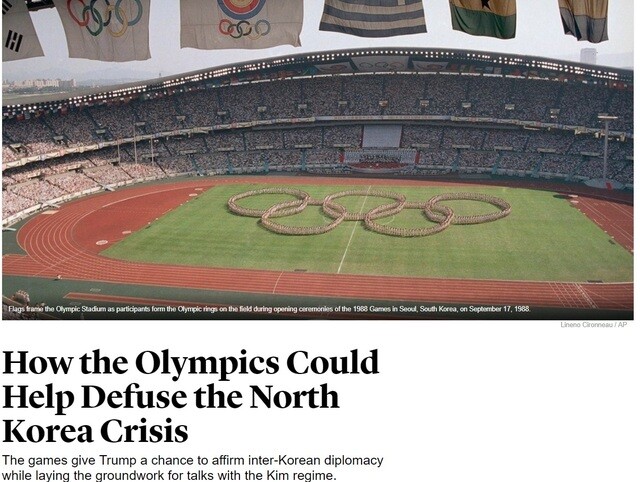hankyoreh
Links to other country sites 다른 나라 사이트 링크
US experts suggest using Olympics as an opportunity to improve US-NK relations

US experts suggested that the Donald Trump administration should emulate the Ronald Reagan administration’s actions during the 1988 Seoul Summer Olympics and use the upcoming Pyeongchang Winter Olympics as an opportunity to improve relations with North Korea.
Stanford University Center for International Security and Cooperation (CISAC) visiting fellow Robert Carlin and Johns Hopkins U.S.-Korea Institute senior fellow Joel Wit published a Jan. 9 piece in The Atlantic titled “How the Olympics Could Help Defuse the North Korea Crisis.” In the piece, the two experts call on the Trump administration to benchmark the Reagan administration, noting that despite the 30-year difference between the 1988 and 2018 Olympics, they both present “an opportunity for Washington and Seoul to coordinate their strategy and move from confrontation to dialogue.”
The authors noted the example of then-South Korean President Roh Tae-woo, who “began considering a new approach: dialogue with North Korea if the [1988 Seoul] Olympics went off without a hitch.” The policy shift came at a time of heightened concerns that North Korea might disrupt the Olympics following the Nov. 1987 bombing of Korean Air Flight 858.
Normally hawkish on North Korea issues, the Reagan administration adopted the mindset that peace on the Korean Peninsula could only be guaranteed by approaching Pyongyang, and began discussions with Seoul on a policy shift toward “engagement” to reduce North Korea’s isolation.
Carlin and Wit wrote that Reagan’s greater openness in North Korea policy laid the groundwork for 1992 talks between US undersecretary of state Arnold Kanter and North Korean Workers’ Party secretary Kim Yong-sun, and eventually for the US-NK Agreed Framework in Geneva.
“With this year’s Olympics, history has offered us a chance to try again. If the United States and South Korea ignore the lesson of 1988, the window will close,” they warned.
The US State Department released an official statement the same day expressing its “welcome” of inter-Korean talks. But in a telephone interview with Voice of America, Bureau of East Asian and Pacific Affairs spokesperson Katina Adams said, “Time will tell if this is a genuine gesture [from North Korea].”
Adams also echoed President Moon Jae-in’s message that no progress could be realized in inter-Korean relations without a solution to the North Korean nuclear program. In a briefing, White House spokesperson Sarah Huckabee Sanders said the “next steps would be denuclearization of the Korean Peninsula,” which she called the US’s “number one priority.”
By Jeon Jeong-yoon, staff reporter
Please direct questions or comments to [english@hani.co.kr]

Editorial・opinion
![[Editorial] Yoon must halt procurement of SM-3 interceptor missiles [Editorial] Yoon must halt procurement of SM-3 interceptor missiles](https://flexible.img.hani.co.kr/flexible/normal/500/300/imgdb/child/2024/0501/17145495551605_1717145495195344.jpg) [Editorial] Yoon must halt procurement of SM-3 interceptor missiles
[Editorial] Yoon must halt procurement of SM-3 interceptor missiles![[Guest essay] Maybe Korea’s rapid population decline is an opportunity, not a crisis [Guest essay] Maybe Korea’s rapid population decline is an opportunity, not a crisis](https://flexible.img.hani.co.kr/flexible/normal/500/300/imgdb/original/2024/0430/9417144634983596.jpg) [Guest essay] Maybe Korea’s rapid population decline is an opportunity, not a crisis
[Guest essay] Maybe Korea’s rapid population decline is an opportunity, not a crisis- [Column] Can Yoon steer diplomacy with Russia, China back on track?
- [Column] Season 2 of special prosecutor probe may be coming to Korea soon
- [Column] Park Geun-hye déjà vu in Yoon Suk-yeol
- [Editorial] New weight of N. Korea’s nuclear threats makes dialogue all the more urgent
- [Guest essay] The real reason Korea’s new right wants to dub Rhee a founding father
- [Column] ‘Choson’: Is it time we start referring to N. Korea in its own terms?
- [Editorial] Japan’s rewriting of history with Korea has gone too far
- [Column] The president’s questionable capacity for dialogue
Most viewed articles
- 1Months and months of overdue wages are pushing migrant workers in Korea into debt
- 2Trump asks why US would defend Korea, hints at hiking Seoul’s defense cost burden
- 3[Editorial] Yoon must halt procurement of SM-3 interceptor missiles
- 4At heart of West’s handwringing over Chinese ‘overcapacity,’ a battle to lead key future industries
- 5[Guest essay] Maybe Korea’s rapid population decline is an opportunity, not a crisis
- 61 in 3 S. Korean security experts support nuclear armament, CSIS finds
- 7Fruitless Yoon-Lee summit inflames partisan tensions in Korea
- 8First meeting between Yoon, Lee in 2 years ends without compromise or agreement
- 9Under conservative chief, Korea’s TRC brands teenage wartime massacre victims as traitors
- 10[Column] Park Geun-hye déjà vu in Yoon Suk-yeol